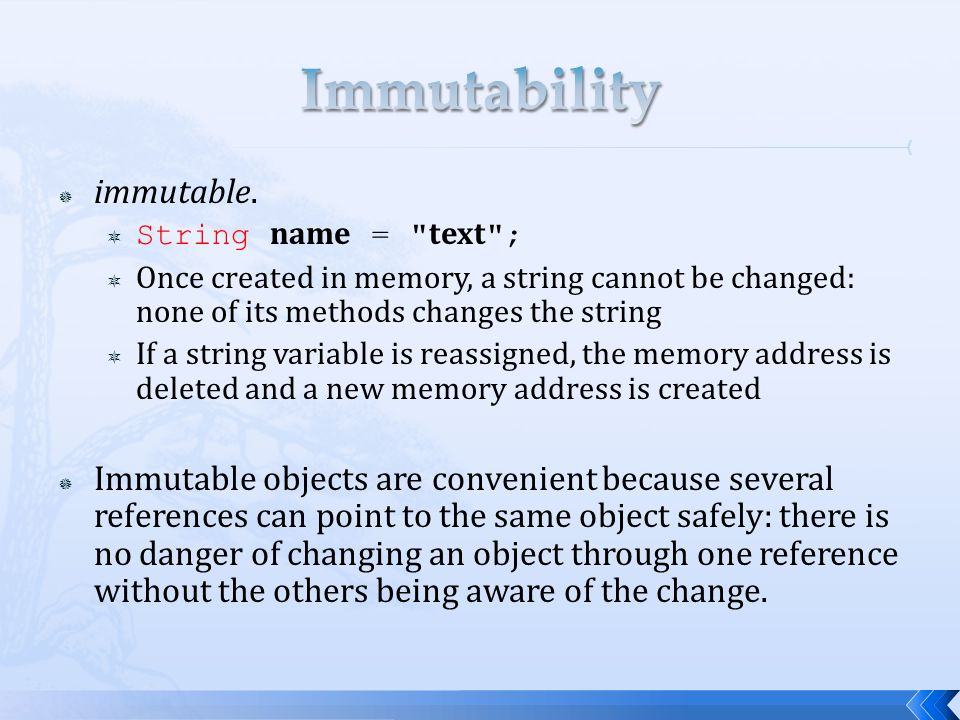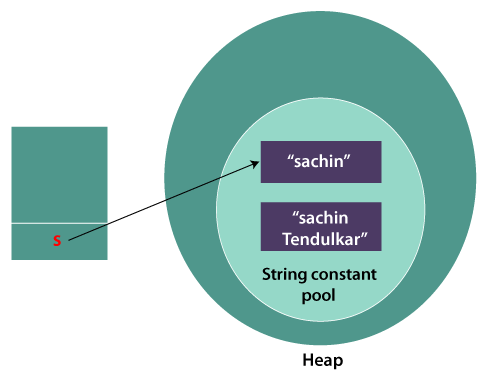Why Are Strings Immutable in Java? Understanding the Core Concepts
What Is Immutable Strings and How It Works
In the world of programming, understanding the idea of unalterable strings is critical for developing robust and protected applications. Immutable strings refer to strings that can not be changed after they are produced, making certain information honesty and predictability within the code. This fundamental principle plays a vital duty in numerous shows languages and provides an unique strategy to managing data. By checking out the details of how immutable strings function, one can uncover a world of benefits and opportunities that can raise the top quality and performance of software application growth.
The Basics of Unalterable Strings
Unalterable strings, as a basic concept in programming, are personality series that can not be altered once they are created. This indicates that once a string is appointed a value, that value can not be modified. In languages like Python and Java, strings are immutable items, resulting in different implications in terms of memory management and data integrity.
Among the key advantages of immutable strings is that they give a complacency in data manipulation. Since the web content of an immutable string can not be customized, it makes sure that the original data remains intact, minimizing the danger of unintentional adjustments during program implementation (Why are strings immutable in Java?). This building additionally simplifies debugging processes, as developers can rely on that when a string is specified, its worth will certainly not be accidentally modified
Moreover, unalterable strings help with efficient memory use. When a new string is developed based upon an existing one, instead of customizing the original string, the new worth is kept separately. This strategy enhances efficiency by decreasing memory fragmentation and streamlining memory allotment processes. Overall, understanding the essentials of unalterable strings is essential for understanding programs concepts and maximizing code efficiency.
Benefits of Immutable Strings
Structure upon the safety and security and performance benefits of unalterable strings, their benefits prolong to improving code integrity and simplifying concurrent programs tasks. By being unalterable, strings can not be modified after creation, which gets rid of the risk of unintended adjustments in the information they keep. This inherent immutability ensures that as soon as a string is developed, its value continues to be continuous throughout the program's implementation, reducing the possibilities of bugs created by unforeseen changes.
Additionally, immutable strings contribute to code integrity by making it simpler to reason about the state of a program. Considering that strings can not be altered, developers can rely on that a string will always hold the exact same value, simplifying debugging and maintenance initiatives. This predictability causes extra trustworthy and steady codebases.

Implementation in Shows Languages
Within different shows languages, the consolidation of unalterable strings is a fundamental aspect that impacts how information is handled and manipulated within code frameworks. The application of unalterable strings varies throughout different shows languages, with each language using its own mechanisms to sustain this principle.

In contrast, languages like C and C++ do not have integrated support for unalterable strings. Developers in these languages need to by hand implement immutability by implementing policies within their code to stop direct adjustments to string things.
Finest Practices for Dealing With Immutable Strings
When handling unalterable strings in programming languages like Java and Python, adhering to ideal methods guarantees protected and reliable data adjustment. One of the vital ideal techniques is to use StringBuilder or StringBuffer as opposed to straight controling strings, especially when managing considerable concatenation operations. These classes provide mutable alternatives for string control, click for info assisting to stay clear of unneeded memory allocations and improving performance.
An additional best technique is to use string interpolation or formatting functions given by the language instead of hand-operated concatenation. This not only boosts readability but also Home Page help in avoiding typical mistakes such as unintentional string adjustments. Furthermore, when working with sensitive information such as passwords or API tricks, it is crucial to stay clear of keeping them as simple text in unalterable strings. Making use of safe storage mechanisms like char ranges or specialized collections for handling delicate details helps minimize safety and security risks related to immutable strings.
Real-world Applications and Instances
Discovering functional implementations of unalterable strings in various markets exposes their significant influence on information integrity and system dependability. In the health care field, unalterable strings play a crucial role in ensuring the protection and confidentiality of individual data. By preventing unapproved adjustments to sensitive details such as medical documents and prescriptions, immutable strings assist maintain compliance with rigorous privacy regulations like HIPAA.
Monetary establishments additionally take advantage of the unalterable nature of strings to boost the security of consumer information and transaction documents. Unalterable strings help protect against fraudulence and unauthorized alterations to monetary information, providing a robust protection against cyber hazards and making sure the trust and self-confidence of customers.

Final Thought
Finally, unalterable strings are fixed and unchangeable series of characters that offer advantages such as string safety and enhanced efficiency in programming. They are applied in various programs languages to ensure information stability and security. Best techniques for functioning with unalterable strings include staying clear of straight adjustments and utilizing approaches that return brand-new string things. Real-world applications of immutable strings include data encryption, caching, and string manipulation jobs.
Immutable strings refer to strings that can not be changed after they are developed, making sure data honesty and predictability within the code. When a brand-new string is developed based on an existing one, instead than changing the original string, the brand-new worth is kept individually.In languages like Java and Python, strings are unalterable by default, implying that as soon as a string object is developed, its value can not be transformed - Why are strings immutable in Java?. Best techniques for working with immutable strings consist of preventing direct adjustments and making use of methods that return brand-new string items. Real-world applications of immutable strings include data encryption, caching, and string control jobs